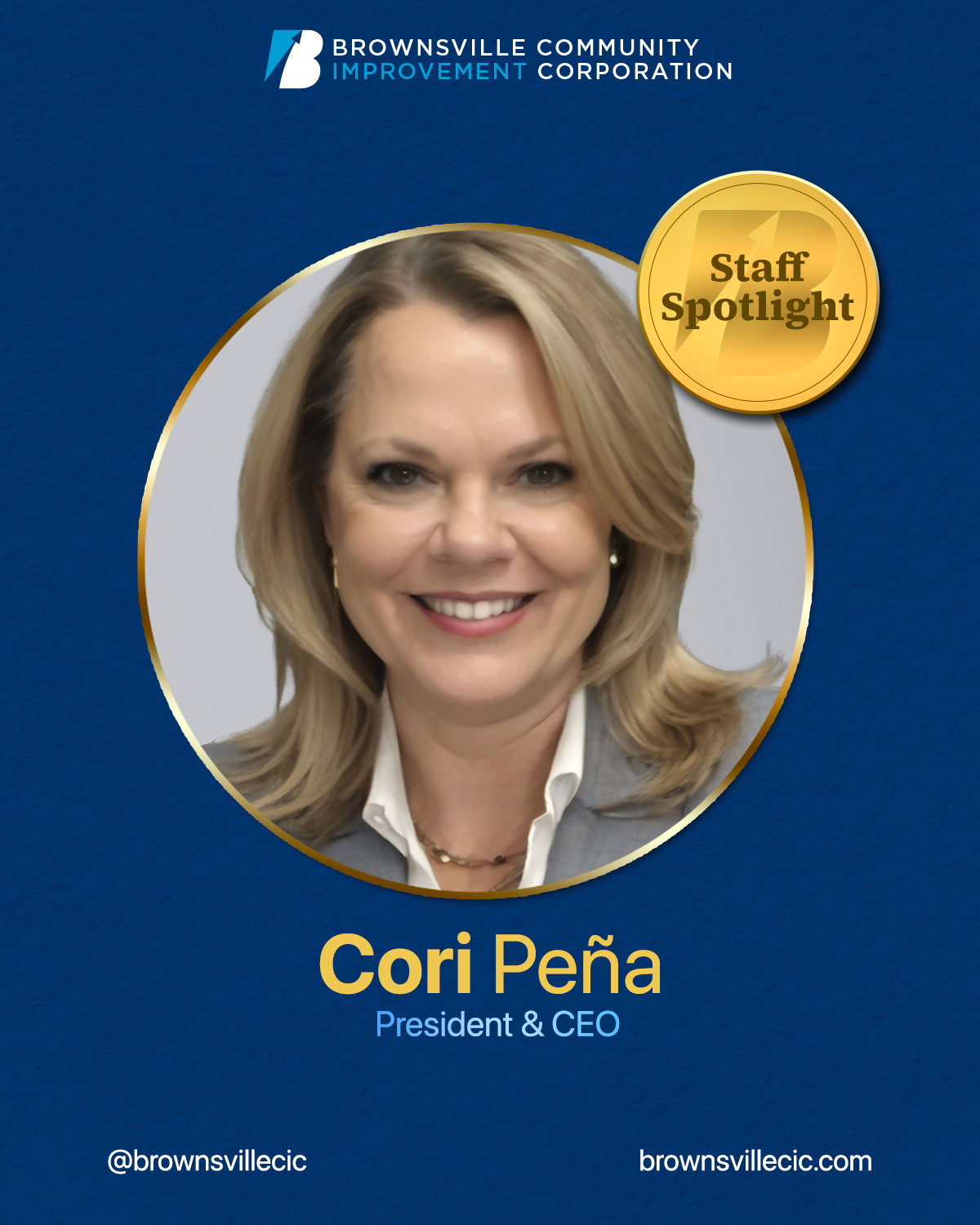
BCIC's President & Chief Executive Officer, Cori Peña, has served 14 years in the organization, introducing initiatives and forging partnerships that have been key in Brownsville's recent downtown revitalization, quality of life projects, and small business and entrepreneurship programs. Cori's work is personal, inspired by both the bright possibilities in Brownsville's future and quiet, fire-lit nights roasting hot dogs with her family.
Many might not know, but your career in economic development started in Harlingen. What made you want to come to BCIC in the first place?
My first real job was working at The Brownsville Herald. And I worked there for five years, but I wanted something different. And I saw a posting at the Harlingen Chamber. And I was honest. In my interview, I told them, “I haven’t done it, but I know I can do it, and this is how I would do it.” So I got the job. I worked there for five years, then I had my daughter — and I worked in Harlingen while living in Brownsville. And that’s when it came to me – I wanted to build my community. I was building Harlingen’s community, but I didn’t live there. Then, I found a job opening for BCIC, which was part of the city at the time. And I remember in the job interview, they said, “Why do you want to be a part of BCIC?” And I said it just felt like there were still things missing. It was still missing quality of life — things for my daughter to enjoy, like trees and parks. I was concerned! Like I tell my son, I just wanted to be a part of growing our community. So that way, my daughter could be proud to live in the community, and now my son can, too.
How do you get to a place in economic development where you can properly balance what works with taking risks?
It all changes constantly. Over the span of 14 years, as my role has progressed, so has Brownsville. I started as a project coordinator at BCIC, and I’ve had to learn as Brownsville grows. It’s always about how, as a team and as a board, we visualize where we fit in and how our projects can fill gaps.
Due diligence is very important in our role. Because we have to build transparency, which is very important to me. Our reputation is really important. When we fund projects, I want the community to say, “That makes sense.” That’s a real balancing act—supporting entrepreneurs, the community, revolving loans, and hitting the right market.
The eBridge Fund is actually doing pretty well, isn't it?
The eBridge Fund is doing pretty well. It’s at a point where now payments and interest go back into the community. It’s great, but we don’t have as much money now. So we have to be watchful. Make sure we make really good funding requests that will help with job creation and help with the development of the community.
What do you think is one thing people gain from their time outside of Brownsville that’s valuable when they come back?
I think we pick up a little bit of utility. A lot of people who work at BCIC, yourself included, have either left Brownsville for a bit or come from Brownsville. I wasn’t born here but have been here for 30 years, and you learn to appreciate what the community offers. It teaches you the value of returning and helping it grow like many people are doing now.
Over the years, there have been different new programs and new initiatives. Were there any that you thought might be risky but had immense payoff?
BIG. It was my idea. Back many years ago, I always wanted to do something because we had community meetings and everyone always talked about how downtown was so blighted. You know, “There’s so many empty buildings, and property owners don’t care about their buildings.” And you know, when I first started at BCIC, I moved to City Hall. There was nothing for downtown, really. So, I presented BIG to the board, and it was a three-year pilot program. We would allocate $200,000 each year for the next three years to activate the buildings. And that started in March 2019. By June, requests were over $200,000. So I had to go back to the board and ask if we could start with $600,000. That was a gamble. But now, we’ve funded 57 projects since 2019 and seen close to $30 million in private investment. That has paid off.
How do you navigate working with developers to ensure not just that these projects bring economic benefits but also align with the needs and values of us living in Brownsville?
I think, like you just said, you work to make sure it aligns with values and needs. We’re open to working with anybody as long as it aligns with what the community can enjoy — it does more for the masses than a singular member of the community, But we don’t work with too many developers. We work more with small property owners. The Sports Park area, for instance, is a huge project. It’s the first time we’ll be dealing with a developer on that scale.
Why do you always have Halloween decorations up in your office?
They’re not all Halloween! There’s Harry Potter, too. And Nightmare Before Christmas. And I’m wearing my Nightmare Before Christmas shoes now. My family will say I’m hard to shop for, but those are all gifts from my kids. Halloween and fall are my favorite times of the year.
Once the nice days are here, how do you take advantage of them?
We explore the city. We cook over an open fire every weekend. Not barbeque — an actual fire pit. Like a lot of Brownsville does. Open fire pit. Another thing we love about this type of weather is going fishing. Like going to Arroyo City and fishing and cooking hot dogs over one of our fire pits.
BCIC has formed really big partnerships, like with UTRGV, to run the eBridge Center. How have these collaborations really amplified our impact, and what message do you think they send to people looking to us?
It validates our impactful work in innovation, community development, and small business growth simultaneously and it enhances our reputation on an international scale. The partnership also strengthens our credibility with our stakeholders and opens doors for innovation, for future partnerships, and also planning more changes.
What’s your escape? I heard you got into nail string art.
I used to do that during COVID — my whole thing was making cactuses with them. I paint, but I haven’t done that in a long time. I like art. That’s my escape, but reading is my escape, too. I’m always reading. I’m reading the novels you get at Target — I like sci-fi and some romance. I started watching Bad Monkey last night.
Our region’s business environment is known for several things, one of them interestingly being a sense of hospitality. How does that fit into the whole equation?
There are some things we do that go the extra mile. We don’t have to do it, but it’s to show that this is how our community embraces visitors and that the stigma you hear on the media platforms is not true. We are very educated, very cultural people. We’re not what their perception is. When they see negatives, I want them to know we have a lot of positives, too. Any chance to break the stigma and open people’s eyes to what’s really happening: that Brownsville is on an upswing. There’s opportunity — fertile soil. That’s why it’s important. Come and plant some seeds. When Hunden Partners came, we took them to see what our downtown is, and we have the second most historic sites in Texas. We’re not letting it fall. We are paying attention. That says a lot. We’re respecting our history but looking forward to the future. One barman was like, “Why are you taking this person here?” I’m like, “Seriously, why not?!” Because they need to see there’s so much more of Brownsville. There are so many facets to Brownsville and I love it. It’s neat now, from when I moved here. I moved here when I was 18. But it’s interesting to see, over the next 30 years, what the future can hold for our children. It’s really cool.



